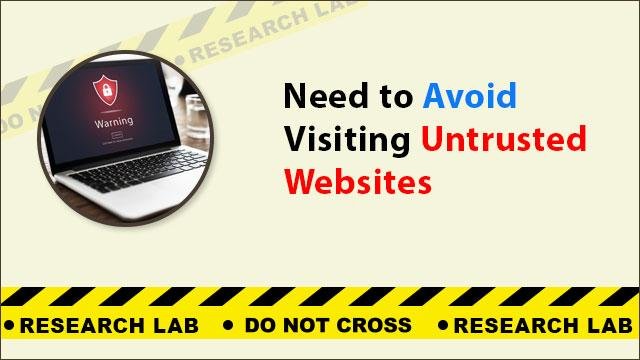In today’s digital landscape, the internet is a treasure trove of data, entertainment, and connection. However, not all corners of this vast web are created equal. Some websites pose significant risks,leading users into a labyrinth of misinformation,malicious content,or even privacy breaches. Whether you’re a casual browser or a seasoned netizen, it’s crucial to navigate this online environment with caution. In this article, we delve into the murky waters of the internet to highlight some of the worst websites you should steer clear of. Our intention is not to shame, but to inform and protect. By sharing thes cautionary tales,we hope to empower you with knowledge,enabling you to make safer choices online. from clickbait traps to scams designed to exploit unsuspecting visitors,we’ll explore the pitfalls that can mar your online experience and offer guidance on how to identify and avoid these treacherous sites. your online safety matters, and understanding the dangers lurking on certain websites is the first step to a healthier, more secure internet journey.
Understanding the Dangers of untrustworthy Websites and Their Impact on Users
In today’s digital landscape, not all websites are created equal, and the risks associated with visiting untrustworthy sites are higher than ever. These unreliable platforms can expose users to a range of dangers, impacting not just personal information but overall online experience. As a notable example, visiting such websites may lead to:
- Data Theft: Your personal information could be captured and sold to malicious entities.
- Malware Infections: Untrustworthy sites may inadvertently install harmful software on your device.
- Phishing Scams: These sites often pose as legitimate businesses to extract sensitive information.
- Financial Loss: Engaging in transactions on dubious sites can result in unauthorized charges.
Understanding the direct consequences of navigating these hazardous online spaces is essential for every internet user. Gezify emphasizes that educating yourself about these risks not only protects your personal data but also enhances your overall digital experience. Here’s a succinct comparison of trustworthy versus untrustworthy websites:
| Criteria | Trustworthy Websites | Untrustworthy Websites |
|---|---|---|
| Secure Connection | HTTPS | HTTP |
| Customer Reviews | Positive and detailed | Suspicious or no reviews |
| Contact Information | Clear and accurate | Vague or missing |
| User Privacy | Respects data protection | Collects excessive personal data |
By recognizing the patterns that distinguish safe websites from their untrustworthy counterparts, users can navigate the internet more confidently. Take proactive steps to ensure your safety by researching sites comprehensively and being wary of those that raise red flags.remember, a little caution goes a long way in protecting your online footprint, especially in an age where digital presence is paramount.
Essential Tips for Safely Navigating the Online World and Protecting Yourself
Navigating the vast expanse of the internet is not without its dangers, especially when some websites can pose significant risks to your security and privacy. As a traveler who frequently connects online to gather valuable information, such as on Gezify, it is crucial to remain vigilant. Here are some essential tips to help you steer clear of malicious sites:
- Stick to reputable sources: Always prioritize well-known websites for your travel information and avoid sketchy links that could redirect you to harmful sites.
- Check for HTTPS: Before entering personal information, make sure the URL starts with “https://” as the ‘s’ signifies a secure connection.
- Beware of pop-ups: Sites that bombard you with excessive pop-ups or require you to accept dubious offers may be traps aimed at collecting your data.
- Use reliable antivirus software: A good antivirus program can help identify and block harmful websites, providing an additional layer of security while browsing.
- Be cautious with downloads: Downloading files from unfamiliar sites can expose your device to malware. Stick to official or recognized platforms.
In addition to these points, consider using a VPN (Virtual Private network) when accessing public Wi-Fi networks, notably while traveling. This simple precaution enhances your online privacy, making it more difficult for malicious actors to intercept your data. Always keep your software and browsers up-to-date, as developers regularly release security patches that protect against new threats. For those considering engaging with forums or blogs for travel advice, including those on Gezify, verifying user reviews and credentials can help ensure you are receiving trustworthy guidance.
| Warning Signs | What to Do |
|---|---|
| Unusual URL structure | Double-check the website’s authenticity |
| Slow loading times | Avoid entering information; consider exiting |
| Unusual requests for permissions | Refuse or ignore any requests that seem excessive |
By applying these precautions, you can profoundly enhance your online safety and enjoy your travels with greater peace of mind. Stay informed and make wise choices to ensure that your digital experience complements your adventures and doesn’t detract from them.
As we wrap up this cautionary guide, it’s crucial to remember that the internet can be a double-edged sword. While it offers endless opportunities for learning and connection, certain websites can pose significant risks to your privacy, mental well-being, and even your security. By staying informed and cautious, you can navigate the online world more safely. Take this list to heart not just as a warning, but as a roadmap to a more positive and enriching internet experience. Stay safe out there, and choose wisely where you click.